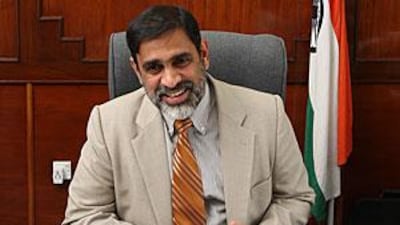DUBAI // Venu Rajamony was handed the reins of the Indian Consulate three years ago, just as the UAE Government announced its amnesty for labourers living here illegally. Within weeks of his arrival as consul general, in mid-2007, nearly 100,000 Indian workers were on their way home.
The consulate staff mobilised more than 400 volunteers from Indian schools, colleges and welfare organisations to work alongside Dubai and Sharjah immigration officials in sorting out more than 60,000 passports and ensuring the safe repatriation of workers not wishing to legitimise their status. A further 95,000 labourers were given legal status. Large crowds of workers that gathered at designated school auditoriums in Dubai were helped by consulate officials.
"A message was implicit there that the Indian government, under no circumstances, encourages anyone to be an illegal here and if they do not have a legal status they should return home," said Mr Rajamony, reminiscing on his role in Dubai. The veteran diplomat from Kerala, will end his tenure in the second week of February. He will return to Delhi to serve in the Ministry of External Affairs. His replacement is another senior diplomat, Sanjay Verma, who is coming from Delhi.
The workers' amnesty was the first major challenge Mr Rajamony faced as the man responsible for the welfare of Dubai's largest expatriate population. "This is one of the most challenging and rewarding diplomatic assignments for any Indian diplomat," he said, summing up his tenure in Dubai. The consulate is responsible for the estimated 1.2 million Indians in Dubai and the Northern Emirates. "The biggest challenges were the size of the Indian community and the pressure and workload here as well as the demand and expectations from the consulate," he said.
The consulate was repeatedly called into action in the first two years of Mr Rajamony's incumbency, as a series of labour protests, often involving Indian workers, rocked Dubai. Consular staff helped the workers and the Ministry of Labour to resolve the rows. The consulate launched initiatives aimed at improving the lives of labourers. Awareness drives were launched for construction workers, including an education campaign to highlight the dangers of sunstroke. Consulate contact numbers were displayed in bus shelters. The social commentator and artist Mallika Sarabhai visited labour camps.
A source of great pride for Mr Rajamony was that his consulate had managed to "open new doors of co-operation" with the UAE authorities, even at a grass-roots level. "I am particularly happy that during my tenure the consulate has been able to build excellent links with government officials of key departments. We have intervened effectively whenever there has been any issue or problem," he said. The consulate provided relief when disaster rocked Dubai's Indian community. In 2008, a fire at a villa in Naif killed 11 men and injured dozens. Another blaze that year destroyed the Naif Souk, where many of the traders are Indian.
Last year, Mr Rajamony played a key role in analysing the impact of the economic crisis on the Indian workforce. His government said more than 150,000 Indians had returned after losing their jobs. The former journalist has recently completed a book on the India-UAE alliance, featuring insights into the history, politics, culture and business of the countries. pmenon@thenational.ae

